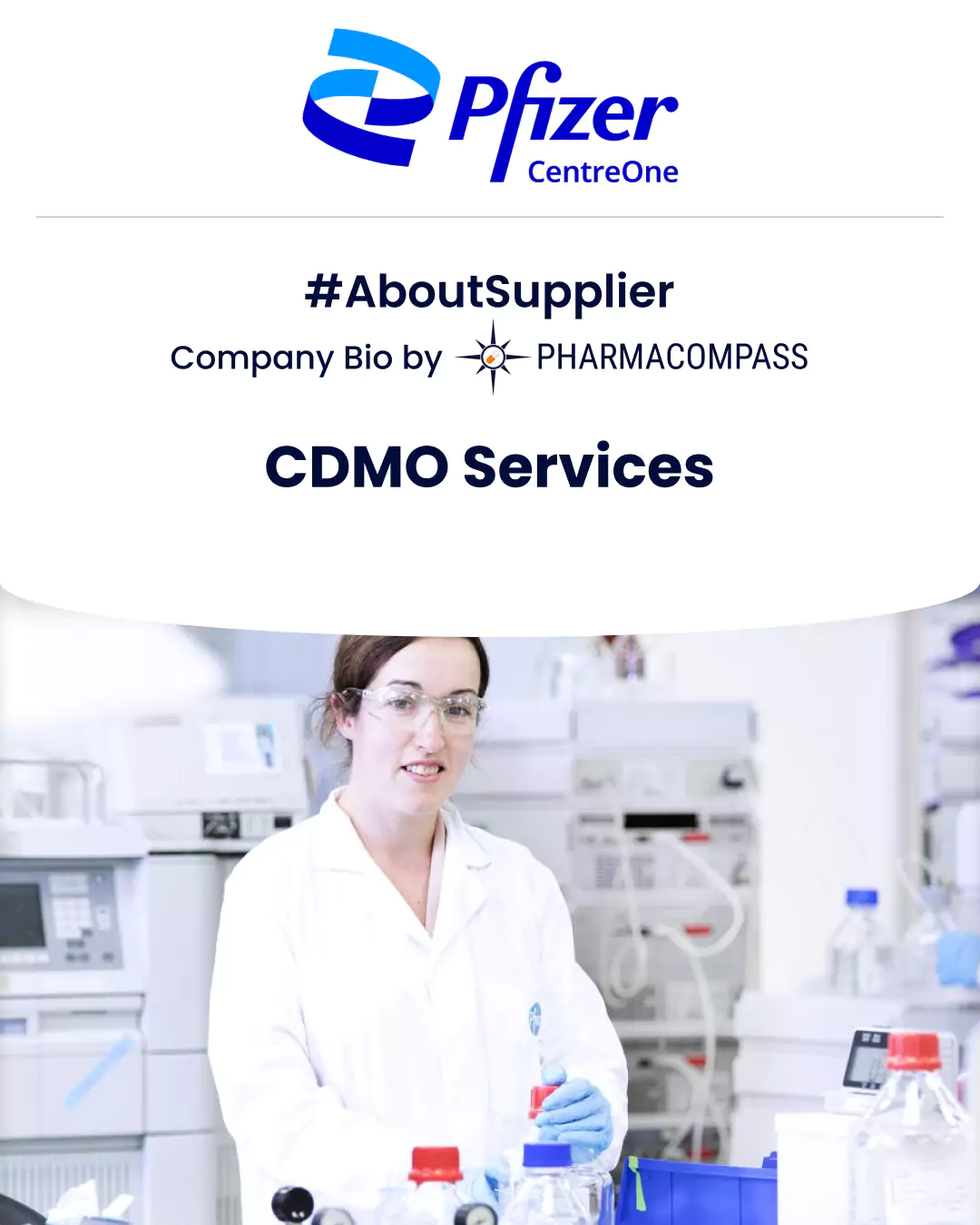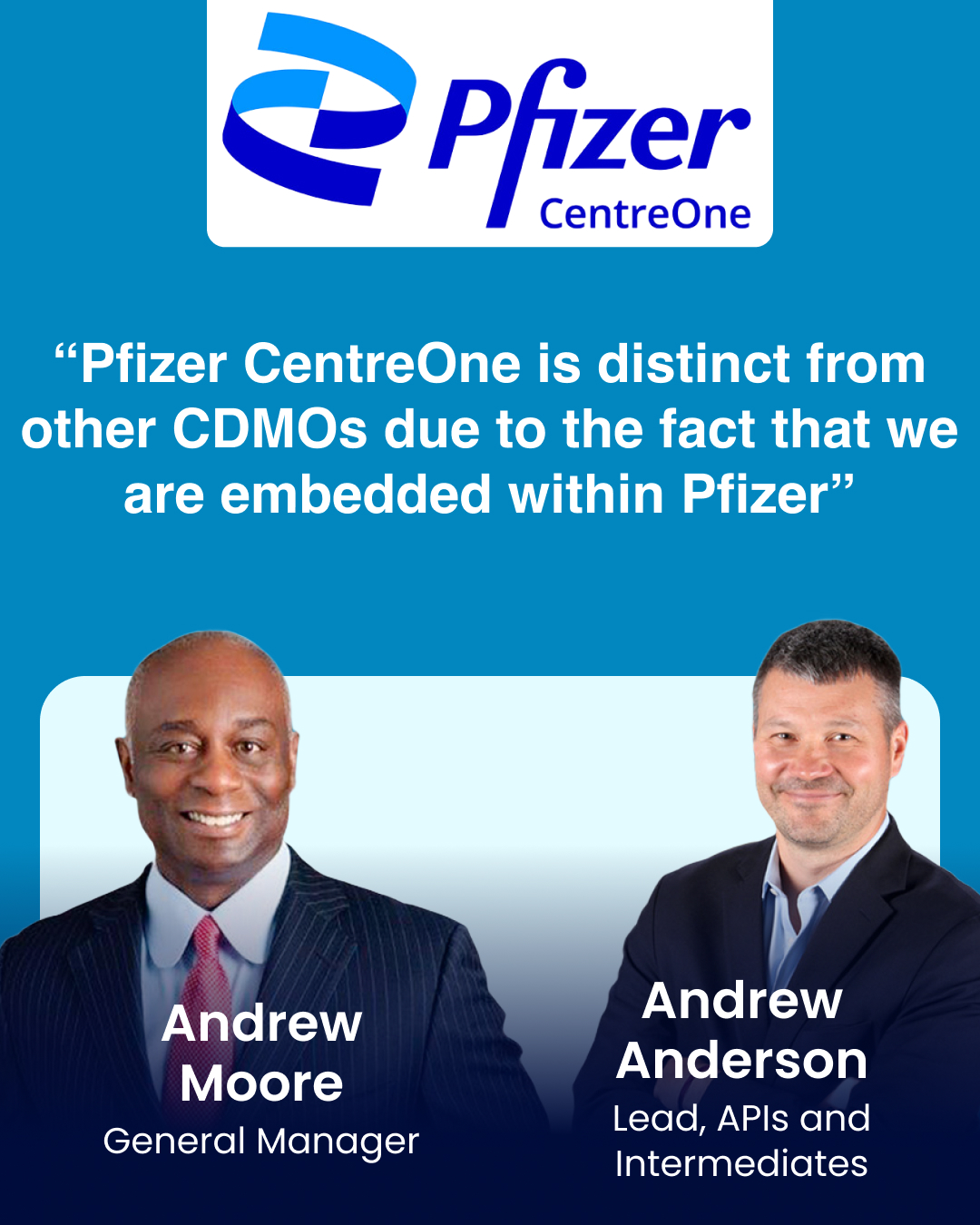
By PharmaCompass
2021-10-11
Impressions: 1446
Overview of CDMOs (contract development & manufacturing organizations) & more on Pfizer CentreOne, a global CDMO & a leading supplier of APIs.
Q1. What CDMO services does Pfizer CentreOne offer?
Pfizer CentreOne, embedded within Pfizer, provides contract development and manufacturing services for small molecule APIs, large molecule biologics, oral solids and sterile injectables. It is also a leading supplier of specialty APIs and intermediates.
Pfizer CentreOne’s global manufacturing network includes more than 35 sites across six continents. From these facilities, they deliver technical expertise and reliable supply to customers across the globe.
Therefore, Pfizer CentreOne functions as a global CDMO and a leading supplier of specialty APIs. Backed by Pfizer’s resources, they deliver technical expertise, global regulatory support and long-term supply. Moreover, for more than 40 years, Pfizer CentreOne has been guiding complex compounds securely and efficiently from development through to commercialization (commercial manufacturing).
Pfizer CentreOne offers various CDMO services to its partners, some of these contract services are noted in detail below.
Development
The development of complex molecules requires expert guidance to overcome formulation issues and meet regulatory requirements. By partnering with Pfizer CentreOne, you gain access to some of the world’s leading development scientists. Pfizer CentreOne offers development services for drug substances (small molecule APIs & large molecule biologics) and drug products (oral solid doses & sterile injectables).
Manufacturing
Working with customers, Pfizer CentreOne combines technical and commercial knowledge with open dialogue to solve challenges and manufacture the highest quality products. It offers cGMP manufacturing services for drug substances (small molecule APIs & large molecule biologics) and drug products (oral solid doses & sterile injectables). Some of these cGMP manufacturing services are noted below.
- Micronization
- Wet & Dry Granulation
- Milling
- Extrusion
- Containment
- IP Protection
Pfizer CentreOne believes that intellectual property is critical to driving innovation and are committed to safeguarding confidentiality of customers. Furthermore, as part of their culture of confidentiality, they have robust systems in place that provide comprehensive tracking and project notifications as well as a controlled, isolated space for customer documentation. They also offer cyber security services.
Regulatory Support
Pfizer CentreOne's Regulatory Affairs team helps ensure a timely, secure, and consistent supply of drug products. The team helps facilitate early engagement with regulators and offers customized submission support.
- Safety data sheets
- Stability reports
- Regulatory open file
- Standard Statements and Declarations
APIs & Intermediates
Pfizer CentreOne has been a leading provider of specialty commercial APIs for more than 50 years. They bring quality, integrity, technical expertise and supply assurance, and seek to continuously improve your drug products.
Their Kalamazoo, MI facility, located in the heart of the United States, produces APIs and intermediates that Pfizer uses for its own branded medicines. Pfizer also pioneered the synthetic chemistry services for complex steroids, hormones, and antibiotics and continues to lead the industry by investing in next-generation processes.
Some key products in Pfizer CentreOne’s API & intermediate portfolio are noted below.
- Dexamethasone
- Hydrocortisone
- Progesterone
- Testosterone
Pfizer CentreOne, is thus a global contract development and manufacturing organization (CDMO) and a leading supplier of small molecule APIs, large molecule biologics, oral solids and sterile injectables. As it is a leading supplier of specialty APIs and intermediates, Pfizer CentreOne functions as a CDMO for APIs and intermediates.
Q2. What is a CDMO and what are the criteria for selecting a CDMO partner?
A contract development and manufacturing organization (CDMO) is a company within the pharmaceutical industry that providesCDMO services ranging from drug product development & manufacturing to pharmaceutical packaging. Pharmaceutical companies partner with CDMOs as a way to outsource drug development and drug manufacturing.
Contract development and manufacturing organizations can provide comprehensive services, from development through to commercialization, and are interested in differentiating their abilities from CMOs focused solely on large-scale manufacturing projects. An increasing complexity in the development of new molecular entities (NMEs) has created a need for outsourcing drug development and manufacturing to CDMO facilities rather than incorporating such activities in-house.
The ability for large pharmaceutical companies to rely on outsourced facilities and smaller companies with a lack of in-house production sites has provided the CDMO services market the opportunity to flourish. Over the past two decades, the CDMO sector has greatly advanced and is now considered an integral source of drug product development and delivery.
Working with CDMOs allows drug companies to benefit from a long-term partnership with an experienced team offering operational excellence, specific scientific skills, equipment and technical resources that are not available internally, resulting in a robust supply chain, reduced risks and optimized costs.
Contract services offered by fully integrated CDMOs include, but are not limited to, pre-formulation, route development, route optimization, analytical development, clinical study materials, scale-up, registration batches and commercial manufacturing.
Taking into account the hundreds of pharmaceutical CDMOs (contract development and manufacturing organizations) out there to choose from, picking the right CDMO can quickly become a daunting task. However, there are a couple of deciding factors noted below that can help you make the right decision.
Some factors used to select the right CDMO partner for you:
-
The CDMO you select must have the capacities and infrastructure to support the size of your project.
-
Along with scale, timing is an important consideration when selecting a suitable CDMO, as they must have the capability to create the final product according to your given timeline.
-
Regulatory compliance - A careful look at CDMOs’ regulatory history with the U.S. Food and Drug Administration (FDA) and other agencies offers an accurate glimpse of their ability to keep executing with precision in the future.
-
Strategic Outsourcing - Through outsourcing every phase of advanced process development and scale-up to an adequately equipped contract development and manufacturing organization (CDMO), more specifically a CDMO for API process development, biotech companies can minimize their risk exposure in terms of initial necessary and ongoing investment.
Q3. When does it make sense to use a CDMO for API development?
The active pharmaceutical ingredient (API) is the foundation of a final drug product and is a crucial consideration when choosing a Contract Development and Manufacturing Organization (CDMO). CDMOs offer CDMO services for APIs and intermediates, to produce them via small or large scale processes.
Over the past decade, the pharmaceutical industry has witnessed rapid growth in outsourcing services, driven by various factors including the growth of small molecules, increasing API complexities and the need to optimize costs.
Despite the efficiencies gained when working with a CDMO for API development, there’s no question that the development of APIs can be a costly and time-consuming process. One way to ensure that costs are more effectively managed is to work with a single or minimum CDMOs on a specific project.
Although some companies are hesitant to outsource CDMO services for APIs, because of concerns around data security and quality or issues relating to changing management, most drug development companies have realized that the return on investment for outsourcing to CDMOs for APIs & intermediates is worthwhile and that with the right partner, the advantages outweigh the potential risks.
Some Advantages of Outsourcing CDMO Services for APIs to a CDMO for API Development:
1. Cost Saving & Restructuring
2. Reduced Operational Cost & Minimized Ownership Cost
3. Accelerated Time To Market
4. Regulatory Support
5. Flexibility
6. Experience in Tech Transfer, Scale Up, Process Development, etc.
7. Large Scale cGMP Manufacturing
8. Access to Novel Technologies
If it is impossible or impractical for a company to make molecules and compounds in-house, API development and custom synthesis can be outsourced to CDMOs and CROs.
-
A significant growth in outsourcing is seen in the increased use of CROs to prepare early stage APIs and intermediates. CROs are often used for specialized activities such as high-potency API synthesis, peptide synthesis, fermentation, etc.
Many pharma firms are turning to CDMOs for API development to reduce capital investment and gain valuable specialized expertise without having to hire expensive, highly specialized scientists and other professionals.
Some situations which warrant the use of CDMOs for API development:
- Companies focused on late stage development activities may choose to outsource CDMO services for APIs to free up capacity for other areas such as marketing.
- Companies with complex projects that require extensive knowledge and know-how as well as advanced equipment may choose to outsource CDMO services for APIs to a suitable partner.
- Smaller companies with limited resources may opt for outsourcing a part or the entirety of ones’ development and manufacturing process to a CDMO.
- Companies looking to speed up their timelines, reduce costs, gain regulatory support, etc. can benefit from outsourcing activities to CDMOs.
Q4. What services do CDMOs for APIs & intermediates offer?
CDMOs for APIs and intermediates offer various services from early development & clinical supply to commercial scale manufacturing or commercialization. CDMO services for APIs & intermediates ranging from clinical supply to commercial scale production of commercial APIs include, but are not limited to:
- Physicochemical Studies
During the physicochemical study phase of API development, various properties of a drug substance are characterized and established. The objective of this preformulation study is to determine the most appropriate form of the API for development.
- Continuous Flow Chemistry
Organic synthesis has traditionally been performed in batch reactors which means in round-bottomed flasks, test tubes, or closed vessels, however, continuous flow chemistry methodologies have recently gained attention from synthetic organic chemists.
Continuous-flow chemistry technology involves the continuous introduction of a stream of chemical reactants into a flow or microreactor to yield a desired reaction product on a continuous basis.
Recently, application of flow technologies for the preparation of fine chemicals, natural products, commercial APIs, HPAPIs and small molecules has become very popular. API continuous flow chemistry is preferred over traditional methods as it improves safety and selectivity and offers long term cost savings.
- Route development & route optimization services offered by CDMOs for API process development:
CDMOs for API process development offer analytical development services like route scouting or route development to design and demonstrate new synthetic routes or methodologies with a focus on IP, safety, costs, atom efficiency, quality and delivery to meet the goal of sustainability in the pharmaceutical industry. Therefore, CDMOs for API process development assist partners in developing cost effective, competitively advantageous, and robust chemical processes that emphasize atom efficiency and minimize waste.
Route development is an analytical development service which eventually leads to route optimization (process optimization). While there are different ways CDMOs conduct route optimization, the ultimate goal is to derive better yields of APIs and eliminate problems that can impact successful commercialization.
Advanced process development technology aids in achieving process optimization. Lately there has been an increasing trend towards achieving route optimization and all the benefits that it imparts, consequently more organizations are outsourcing advanced process development activities to CDMOs for API process development.
- Scale Up
After the familiarization and process optimization stages comes scale up of materials in the kilo lab. Scale-up is the term used to refer to the increase in the batch size of a product. As the development of a new drug substance progresses, the batch sizes manufactured generally increase. Scale up takes APIs from clinical to commercial scale and consequently enables the production of commercial scale APIs and intermediates.
- Commercialization
API commercialization is a costly and time-consuming process and the company you choose to partner with along this journey should be carefully considered. Effective third-party commercialization service providers (e.g. CDMOs) are able to integrate the infrastructure, personnel and processes to create and maintain a seamless patient experience which results in product loyalty that withstands product loss of exclusivity or introduction of competing drug products.
Fully integrated contract development and manufacturing organizations (CDMO) are flexible, good at problem solving and may have widespread experience in scaling up fine chemicals, chiral compounds, intermediates and APIs. There are numerous CDMOs for APIs & intermediates offering synthetic chemistry services.
The PharmaCompass Newsletter – Sign Up, Stay Ahead
Feedback, help us to improve. Click here
Image Credit : Biosynthesis, tech advancements by PharmaCompass is licensed under CC BY 2.0
“ The article is based on the information available in public and which the author believes to be true. The author is not disseminating any information, which the author believes or knows, is confidential or in conflict with the privacy of any person. The views expressed or information supplied through this article is mere opinion and observation of the author. The author does not intend to defame, insult or, cause loss or damage to anyone, in any manner, through this article.”






